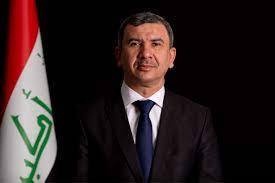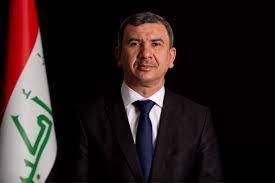Iraq is looking forward to establishing various power generation stations in partnership with global and Arab companies, some of which will operate on fossil fuels and others that will utilize solar energy. Additionally, the country aims to utilize the gas that is flared during oil extraction by incorporating it into the electricity production system, as explained by Iraqi Oil Minister Ihsan Abdul Jabbar in a special interview with "Al-Sharq" channel conducted by journalist Nour Amasha. He indicated that Iraq currently consumes approximately 3,500 million standard cubic feet of gas, of which 1,300 million is produced in Iraq while the remainder is imported from Iran. The actual demand for gas in Iraq reaches 4,500 million cubic feet, "and we aim to completely stop flaring gas in all fields by 2025."
**A Radical Solution for Electricity**
Abdul Jabbar noted that Iraq began its action plan to stop gas flaring in 2018, where the state provided investments for Basra Gas Company to construct new facilities, operating in partnership with Dutch company "Shell" and Japanese company "Mitsubishi." The completion rate has exceeded 40%, and these facilities will add 400 million standard cubic feet in 2022 and 2023 for electricity generation. Furthermore, there are currently new projects in Dhi Qar and Maysan governorates, and the ministry is seeking a contractor to invest in the Akkas field, aiming to achieve the ministry's goal of producing 4,000 million cubic feet of gas by 2025, which represents 90% of Iraq's needs for electricity generation.
According to Abdul Jabbar, his country will require more gas fuel for electricity production by 2030 to accommodate a population increase to 50 million, an increase of 10 million from the current figure. He expects that Iraq will need to import 15% of the gas fuel despite the implementation of the plan to increase production to 4,000 million cubic feet by 2025. He also revealed that infrastructure is currently being built in the south to open new gas import routes from other countries, such as Qatar, as needed.
**Relation with Saudi Arabia**
The Iraqi Oil Minister emphasized that the relationship with Saudi Arabia is very important for his country "to create a robust economy, with the Kingdom providing us with all the support in terms of consultations and data." He revealed that positive discussions took place six months ago with Saudi Crown Prince Mohammed bin Salman and Energy Minister Prince Abdulaziz bin Salman regarding petrochemical production, localizing petrochemical industries, and gas production in the Akkas field, noting that both countries have an interest in partnership and that data exchange is currently underway, with expectations of signing memorandums of understanding soon.
On another note, the minister stated that Iraq's budget requires oil prices to be $78 per barrel, expecting a budget shortfall this year as the current average price per barrel stands at $65. However, he affirmed that Iraq aims to create a balanced oil market, considering $75 per barrel to be a balanced price for producers and consumers. He clarified that his country works with its OPEC partners to maintain a good oil price and respects the organization's reduction plans, and thus does not seek exemptions to increase production. He confirmed that Iraq will not return to a prepaid oil sale agreement even if prices drop.
**Self-Sufficiency**
Regarding meeting the country's gasoline needs, Abdul Jabbar stated that oil companies are under pressure from the ministry to reach a refining capacity of one million barrels by mid-2023, with the aim of halting imports completely. There will be new units in the Dora refinery owned by "Middle Refineries Company," where a significant portion has already been completed. New projects are also underway in the Shuaiba and Karbala refineries, with the ministry aiming to reduce gasoline imports by 50% in 2021, reaching 90% by the end of the following year, and completely stopping imports by mid-2023. He noted that the previous phase of the ministry's relationship with refinery companies was not successful, and efforts are being made to strengthen this relationship.
Regarding Iraq's purchase of the stake of American company "ExxonMobil" in the "West Qurna 1" field through state-owned Basra Oil Company, the Iraqi minister disclosed that negotiations are progressing steadily and that the deal will be finalized before July.
**Renewable Energy**
According to the Iraqi Oil Minister, projects have been approved for electricity generation from solar energy in Karbala and Alexandria with a capacity of 525 megawatts through a Norwegian company, in addition to projects being referred to smaller companies in the regions of Muthanna, Samawa, and Al-Khadr, bringing the total generated power from these projects to 750 megawatts. He added that an agreement has been signed with Total to implement renewable energy projects in the southern and central regions targeting electricity generation equivalent to 1 gigawatt, which has entered into effect, with production expected to start at around 500 megawatts by the end of 2022, and for the stations executed by "Total" to reach their full production capacity during 2023.
Abdul Jabbar revealed that talks are ongoing with the UAE side through "Masdar" to implement solar energy projects, with technical discussions currently underway to sign an agreement soon, targeting an electricity generation capacity of up to 2 gigawatts. Additionally, discussions are taking place with Saudi company "ACWA Power" for the implementation of renewable energy projects. Contracts for renewable energy are expected to be signed by 2025, aiming for a production capacity of between 10 and 12 gigawatts, representing about 25% of Iraq's electricity needs, which exceed 40 gigawatts, "and we are working gradually to fully integrate this energy production by 2030," according to Minister Ihsan Abdul Jabbar.




